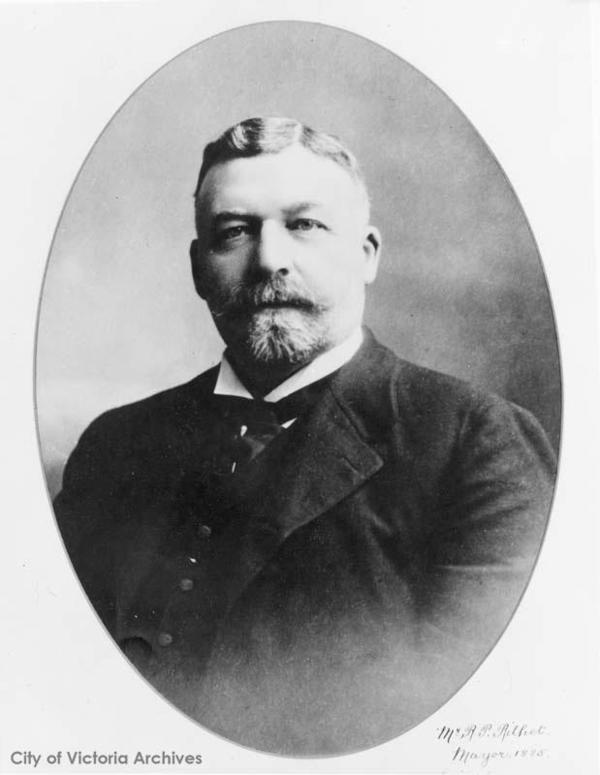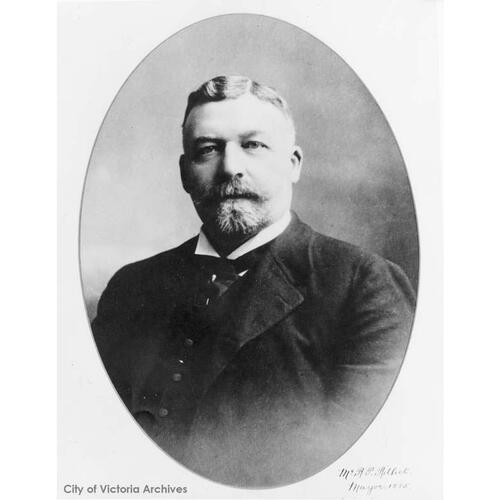
Source: Link
RITHET, ROBERT PATERSON, businessman and politician; b. 22 April 1844 at Cleuchhead, near Applegarth, Scotland, fourth son of John Rithet and Agnes Paterson; m. 27 Oct. 1875 Elizabeth Jane Hannay Munro in St Andrew’s Presbyterian Church, Victoria, and they had two sons and one daughter; d. 19 March 1919 at his family home, Hollybank, in Victoria.
The son of a respectable farmer in Dumfriesshire, R. P. Rithet was educated at the college in Annan, where he pursued classics, and in 1859 was apprenticed to a Liverpool merchant firm. He travelled to Victoria in 1862, and for two years prospected for gold and assisted in road construction in the Cariboo district of British Columbia. In 1865 he was employed by Gilbert Malcolm Sproat, who represented the London commission and shipping firm Anderson and Company on Vancouver Island. When Sproat went to England later that year Rithet managed his Victoria office. In February 1869 Sproat sent Rithet to San Francisco to develop a wholesale trade in English goods, but Rithet soon reported that the market for imports was “overdone,” and unprofitable because of high tariffs, and in June he returned to Victoria.
Rithet got this start in business in an unstable economic climate. As the British Columbia gold-rush faded in the mid 1860s, the population fell, markets grew overstocked, the commission trade turned volatile, merchants’ debts mounted, and the value of banks’ collateral in real estate crumbled. Rithet became an astute judge of the market and the business community in Victoria and San Francisco. Economy and caution were his watchwords; he learned quickly that commission agents needed to diversify their portfolios to remain afloat; he gathered credit information on his clientele; and while in San Francisco he became friends with Sproat’s business associate Andrew Welch, a wealthy and well-connected merchant from Scotland. These experiences were all formative influences on Rithet’s career.
In April 1870 Rithet moved to the Victoria firm of J. Robertson Stewart on a salary of $1,500 per annum. When Stewart’s health failed the next year and he looked to retirement, Welch bought out his firm on Rithet’s behalf and in September 1871 a new partnership, Welch, Rithet and Company, was announced in the press, capitalized at $200,000. Rithet ran the main Victoria office from Wharf Street. He drew a salary of $350 per month (and a $3,000 per annum bonus), retained Stewart’s 100 or so clients, and was optimistic about his prospects. He thought that British Columbia’s confederation with Canada promised a new era of “improvement and progress,” and through Welch he had excellent “outside Connections.”
During the 1870s and 1880s Rithet consolidated Stewart’s wholesale, commission, and insurance interests, and he was at the forefront of economic diversification in the province. In 1882 he became the vice-president of Victoria’s Albion Iron Works (established 1861), and with Robert Dunsmuir* boosted its sales. He was a director of the Canadian Pacific Navigation Company, formed in 1883, which merged two steamship lines operating between Vancouver Island and the mainland. During the 1880s he also became the owner of flour mills in Enderby and Vernon, and the leading commission agent in the nascent salmon-canning industry [see Alexander Ewen*], handling the production lines of nine firms. He traded heavily in real estate in and around Victoria and the lower mainland, was a major shareholder in the British Columbia Cattle Company, and had large farms at Victoria and Delta, in which he took a great interest.
Rithet epitomized economic development in the province during this period, which was based on Victoria’s tight-knit business community of merchant houses with strong commercial ties to San Francisco. In the early 1870s Rithet had formed a close association with William Curtis Ward – from 1866 to 1896 the manager of the Bank of British Columbia (which financed this Victoria–San Francisco business connection) – and in 1875 he had married the daughter of Alexander Munro, the manager of the Hudson’s Bay Company’s lands in British Columbia. Some of Victoria’s most influential business leaders were trained by Rithet. The city’s merchants built up a stock of local capital by contracting with each other and collaborating on new ventures. Merchants became entrepreneurs, and investment was guided by the Chamber of Commerce of Vancouver Island, to which Rithet was elected in 1872. From 1879 to 1885 Rithet was president of the chamber’s successor, the British Columbia Board of Trade, fronting a range of initiatives. The Victoria business community was also active in local politics and civic affairs, developing the city’s infrastructure and attracting investment. Rithet was no exception. He was made a justice of the peace in 1873, sat on various public boards, and in 1885 was mayor of Victoria; during his mayoralty he worked to improve public utilities. Between 1894 and 1898 he would sit in the provincial legislature. Both in and out of politics, he was one of Victoria’s most ardent promoters. By the late 1880s Welch, Rithet and Company was the biggest merchant firm in British Columbia, and with wealth had come social prestige. In 1875 Rithet had built a mansion on Humboldt Street to mark his marriage into a respectable family; he became a member of Victoria’s Union Club and the Quadra Masonic Lodge, and mixed in élite circles.
The 1890s mark a shift in Rithet’s career and British Columbia’s economy. Andrew Welch died in 1889. Rithet became president of Welch and Company in San Francisco and reorganized his Victoria business into R. P. Rithet and Company Limited in January 1890. Many of Rithet’s employees became shareholders, and the company was soon capitalized at $1 million. In 1890 it turned over $3 million in business, and Rithet remained successful. But as Vancouver rose to economic prominence, attracting international capital as the western terminus of the Canadian Pacific Railway, Victoria suffered. Many of its merchants could not compete with large resource-extraction companies that took advantage of the province’s new continental connections and purchased their goods and equipment from non-local firms.
Rithet responded to these changing circumstances by defending Victoria’s business position while diversifying his own portfolio. In 1889 he consolidated Welch’s sugar business; he represented a number of Hawaiian sugar cane mills and planned to build a refinery in Victoria. When Benjamin Tingley Rogers opened a refinery in Vancouver in 1890, Rithet and other Victoria merchants undercut him by flooding the market with cheap sugar from Hong Kong. Rogers competed, and encouraged some Victoria wholesalers to back down, but Rithet held firm until 1896 when his suppliers withdrew their support because they were suffering heavy losses. This trade war typified Victoria-Vancouver rivalry in the 1890s.
In the late 1880s Rithet had extended Victoria’s Outer Wharf in part to protect the city’s oceanic trade, and established the Victoria Wharf and Warehouse Company (incorporated in 1898) to handle steamship cargoes. Initially dubbed Rithet’s Folly, the Outer Wharf was soon successful and by 1910 accommodated an average of 75 steamers per month. In the early 1890s Rithet returned to the idea of running a railway from the Rockies to Victoria. His British Pacific Railway had backers in Britain, was supported widely on Vancouver Island, and was debated in the provincial legislature. When Premier John Herbert Turner* pulled government support from the scheme in 1896 because it called for heavy subsidies and land grants, there was a public outcry on the island and his government tottered.
Rithet also adapted to new economic trends. He invested in land and mining companies on the mainland, and in 1897 promoted another ill-fated railway from the coast to the Kootenays, hoping to retain mining wealth in the province instead of allowing it to be drained off to the United States [see Daniel Chase Corbin]. In the legislature he stood up for mainland as well as Vancouver Island interests, and criticized the structure of provincial-dominion fiscal relations.
No one individual could prevent the economic tide from turning, however. In the 1890s the profits of the Albion Iron Works declined. In 1891 Rithet merged his canning interests into the Victoria Canning Company Limited to compete with Henry Ogle Bell-Irving*’s Anglo–British Columbia Packing Company formed that year. Rithet’s company, being smaller, was less able to stand the risks inherent in the industry; it struggled and in 1902 would be bought out by the British Columbia Packers’ Association. Rithet himself began to concentrate on his sugar business, and by the late 1890s was spending most of his time in San Francisco. When in Hawaii in 1897 as consul for British Columbia, he made the most out of Hawaiian opposition to American annexation and the sugar trust, and signed supply contracts with individual planters. On returning to San Francisco he organized the California and Hawaiian Sugar Refining Company, becoming its president.
Rithet resigned the presidency of Welch and Company in 1915 because of ill health and withdrew steadily from business life. He died in 1919, leaving an estate of over $800,000. The Victoria Daily Colonist praised him as “a man of large vision and many activities,” and noted his “unwavering faith in the future of Victoria.” Rithet’s business career encapsulates the pattern of economic change in British Columbia between 1865 and 1920.
BCARS, Add. mss 504; Add.
Cite This Article
Daniel Clayton, “RITHET, ROBERT PATERSON,” in Dictionary of Canadian Biography, vol. 14, University of Toronto/Université Laval, 2003–, accessed January 29, 2026, https://www.biographi.ca/en/bio/rithet_robert_paterson_14E.html.
The citation above shows the format for footnotes and endnotes according to the Chicago manual of style (16th edition). Information to be used in other citation formats:
| Permalink: | https://www.biographi.ca/en/bio/rithet_robert_paterson_14E.html |
| Author of Article: | Daniel Clayton |
| Title of Article: | RITHET, ROBERT PATERSON |
| Publication Name: | Dictionary of Canadian Biography, vol. 14 |
| Publisher: | University of Toronto/Université Laval |
| Year of publication: | 1998 |
| Year of revision: | 1998 |
| Access Date: | January 29, 2026 |



